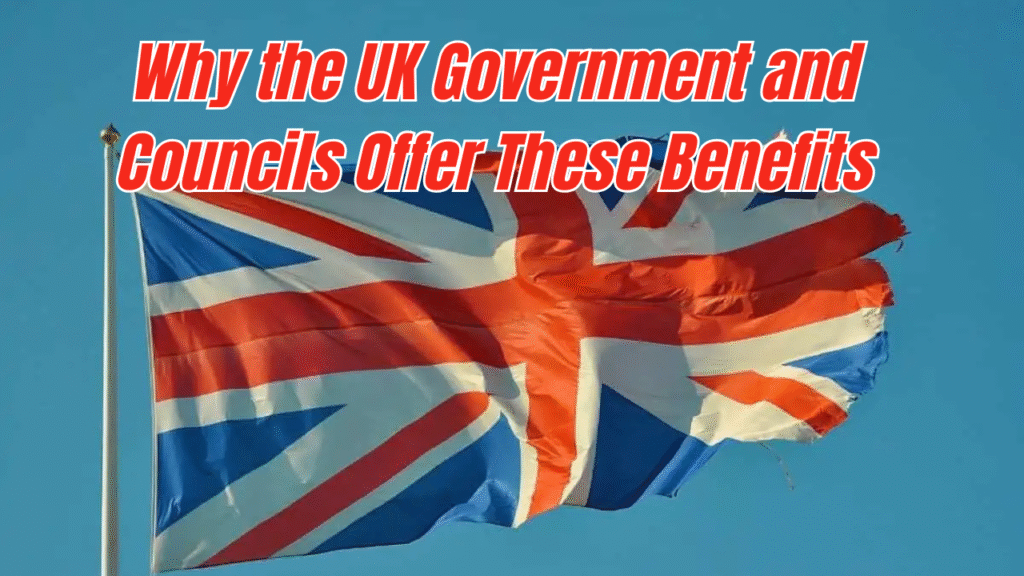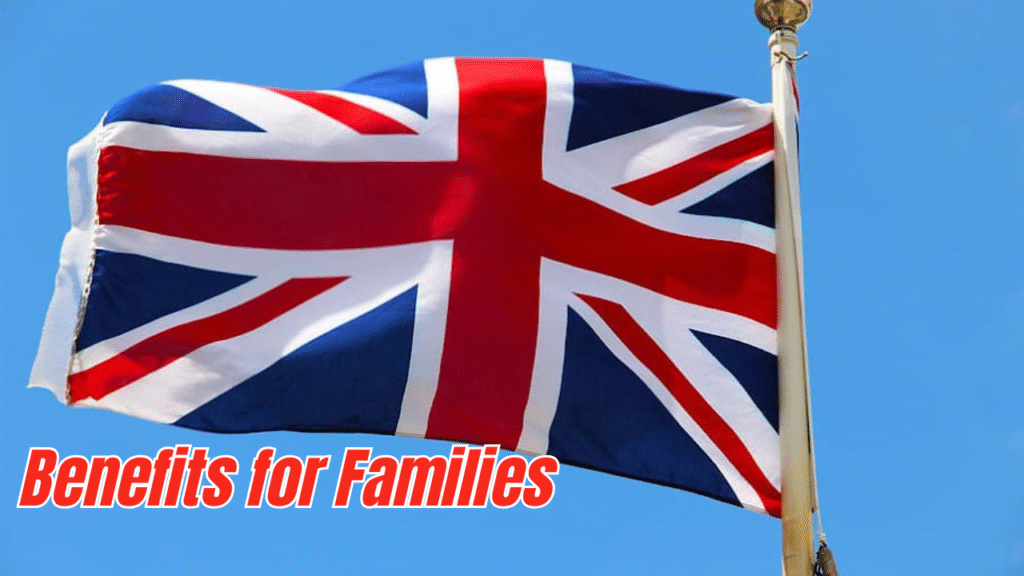1. Introduction
In today’s tough economic climate, UK residents are eligible for up to £40,000 in cumulative support, including grants, subsidies, and practical benefits. However, many eligible individuals miss out simply because they don’t know what they qualify for.
This guide reveals the wide variety of free perks available in 2025 — from heating grants and childcare support to travel passes, NHS exemptions, and more — and explains how to apply, who qualifies, and how to maximize your entitlements.
2. What Are “Free Perks” Worth £40,000?
“Free perks” refer to non-repayable financial support and services offered by the UK government, local councils, and affiliated organisations. This includes cash grants, bill discounts, vouchers, free equipment, and services like free transport or meals.
When added up over the course of a year — or several years — many households may qualify for benefits totalling £40,000 or more, especially if they fall into multiple eligibility categories (e.g. low-income, disabled, with children, pensioners, carers).

3. Why the UK Government and Councils Offer These Benefits
These benefits are part of the UK’s welfare and social safety net, aimed at:
- Reducing poverty
- Supporting families and vulnerable populations
- Promoting energy efficiency
- Helping people return to work
- Improving quality of life
They are funded through taxation and distributed via national programs, such as Universal Credit, and local government schemes.
4. Who Is Eligible for These Perks?
Eligibility varies by benefit, but you may qualify if:
- You receive Universal Credit, ESA, JSA, PIP, or Pension Credit
- Your income is below a certain threshold
- You are disabled or a carer
- You have children under 18
- You are a student, unemployed, or retired
Many schemes have overlapping criteria, so applying to one can often unlock others.
5. Breakdown of the £40,000 in Free Support
| Perk Type | Value (Annual/One-Time) |
|---|---|
| Warm Home Discount | £150–£500 |
| Winter Fuel Allowance | Up to £600 |
| Free NHS Prescriptions | ~£120/year |
| Housing Benefit/Council Tax | £1,000–£6,000/year |
| Universal Credit Add-ons | £1,000–£3,000/year |
| Childcare Vouchers/Tax-Free | £2,000–£5,000/year |
| Free School Meals | £400/child/year |
| Broadband/Device Schemes | £250–£1,000 |
| Disability Equipment Grants | Up to £5,000 |
| Motability Scheme Value | £2,000+/year |
| Carer’s Allowance | £4,000+/year |
| Jobseeker Support Schemes | £1,000+ |
| Council Vouchers | Up to £300 |
| Household Support Fund | £500–£1,000/quarter |
| Home Improvement Grants | Up to £10,000 |
| Green Homes/Energy Schemes | Up to £7,500 |
6. How to Apply for Each Type of Perk
Each scheme has its own process. Some are automatic with benefit claims (e.g. free NHS prescriptions for UC claimants), while others require:
- Online application via GOV.UK
- Contacting your local council
- Speaking with a GP, school, or housing office
- Filling out forms with supporting documentation (income, ID, etc.)

7. Benefits for Families, Seniors, and Low-Income Households
Families:
- Tax-Free Childcare
- Child Benefit
- Free school meals
- Healthy Start vouchers
Seniors:
- Winter Fuel Payment
- Pension Credit
- Free TV Licence (75+)
- Free bus pass
Low-Income:
- Universal Credit
- Council Tax Reduction
- Housing Benefit
- Food vouchers
8. Universal Credit Add-Ons and Hidden Perks
Many Universal Credit recipients can access:
- Free prescriptions and dental care
- Energy efficiency upgrades
- Advance payments
- Clothing/Job start grants
- Back-to-School grants
Even if your UC amount is small, the add-ons can be substantial.
9. NHS and Healthcare Freebies
If you receive means-tested benefits or are on a low income, you may qualify for:
- Free prescriptions
- Free dental checkups
- Free eye tests and glasses vouchers
- Travel refunds for hospital visits
- Free wigs and surgical support garments
Apply through the HC1 form for Low Income Scheme if not automatically covered.
10. Housing, Council Tax, and Utility Bill Perks
Your local authority may offer:
- Council Tax Reduction or exemption
- Housing Benefit
- Discretionary Housing Payment
- Emergency Rent Support
- Council energy rebates or appliance grants
These can save you thousands annually.
11. Energy-Saving Schemes and Green Grants
Schemes like:
- ECO4 (Energy Company Obligation)
- Green Deal
- Boiler Replacement Grants
- Smart Thermostat installations
- Solar panel support
Many are targeted at low-income or vulnerable homes to reduce energy use and bills.
12. Free Childcare and Education-Related Perks
Parents can receive:
- 15–30 hours/week of free childcare
- Tax-Free Childcare worth up to £2,000/year
- Free school meals
- Free uniforms or PE kit help
- Pupil Premium (extra school support)
Apply via HMRC, your local school, or nursery provider.
13. Employment and Job-Search Assistance Perks
Jobseekers can access:
- Jobcentre Plus travel discounts
- Restart and Kickstart schemes
- Job interview clothing grants
- Skills and CV workshops
- Reimbursement for childcare while job hunting
Speak with a Jobcentre work coach to access these.
14. Transport Discounts and Travel Perks
Eligible residents may qualify for:
- Disabled Railcards
- Jobcentre Plus Travel Discount Card
- Free or discounted bus pass
- Senior Railcard (at discounted rate)
- Blue Badge parking
Savings can total £500–£1,000/year depending on usage.
15. Digital and Broadband Access Schemes
- Social broadband tariffs from BT, Virgin, and Sky
- Free or subsidised devices for school kids
- Local library or council digital inclusion programs
16. Help for Carers and Disabled Individuals
- Carer’s Allowance (£76.75/week)
- Disabled Facilities Grant
- Blue Badge
- Motability Scheme
- Access to Work support
Check with DWP or your local council for grants and equipment programs.
17. How to Track Applications and Claim Updates
You can:
- Log into GOV.UK accounts
- Use Benefit calculators
- Track UC and other applications via journal entries
- Contact councils directly via phone or email
18. Common Reasons for Rejection and How to Avoid Them
| Reason | Solution |
|---|---|
| Missing documents | Always submit ID, proof of income |
| Income above threshold | Double-check means-test calculations |
| Incomplete forms | Get help from a benefits advisor |
| Applied to wrong council/scheme | Use postcode tools to locate correct body |
19. Tips for Maximising Your Benefits
- Check eligibility annually
- Use benefit calculators like Turn2Us or EntitledTo
- Keep documents scanned and ready
- Apply early, especially for limited-fund schemes
- Combine council, national, and charity benefits
20. Conclusion
With the cost of living still high, there’s no shame in claiming support you’re entitled to. Whether you’re unemployed, working part-time, supporting a family, or retired, up to £40,000 in free perks are available to help improve your quality of life.
Act today — understand your options, gather the necessary documents, and apply confidently through the correct channels.
21. FAQs
1. What exactly are “free perks” worth £40,000?
They are cumulative government benefits, grants, discounts, and services that, when combined, can be worth up to £40,000 per household.
2. How do I find out what I’m eligible for?
Use online benefit calculators or speak to your local council or a Jobcentre advisor. Eligibility depends on income, benefits received, health status, and family circumstances.
3. Can I apply for multiple perks at once?
Yes, in most cases. One benefit (like Universal Credit) often unlocks access to others like free prescriptions, tax relief, or housing support.
4. What if my application is rejected?
You can appeal or ask for a reassessment. Ensure all your documentation is accurate and updated.


